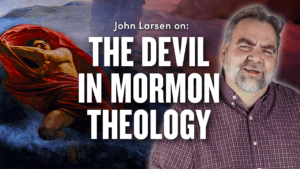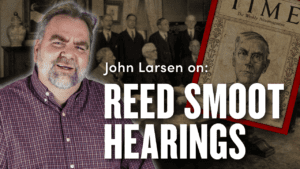Supreme Court Amicus Curie briefings are a way for organizations to influence and become involved in significant Court cases. For many years the church has used its high-powered attorneys to file briefs in major cases. We will discuss which cases and what the church truly values.
Special Guest: Sam Shelly
Update: We’ve got a new episode on another case the Church recently supported 1781: Mormon Church Involved in Supreme Court Discrimination Case
Mormon Expressions is made possible by generous donors!
Help us continue to deliver quality content by becoming a donor today:
John & Carah on Other Platforms:
- Mormon Expressions Podcast on Spotify
- Nuancehoe on YouTube
- Nuancehoe on Patreon
- John Larsen on YouTube
Support Mormon Stories Podcast here:
- One-time or recurring donation through Donorbox
- Support us on Patreon
- Pick “Mormon Stories” as your charity on Amazon Smile or through the Amazon App
Our Platforms:
- Patreon
- Spotify
- Apple Podcasts
Contact us:
MormonStories@gmail.com
PO Box 171085, Salt Lake City, UT 84117
Social Media:
Show Notes:
Amicus Briefs:
- Bob Jones University v. United States, 461 U.S. 574 (1983) | Library of Congress PDF
- Corp. of Presiding Bishop of Church of Jesus Christ of Latter-day Saints v. Amos, 483 U.S. 327 (1986) | Library of Congress PDF
- Amicus Brief Of Mormon Church In Ramani v Segelstein | Archive.org PDF
- Obergefell v. Hodges, No 14-556 | SupremeCourt.gov PDF | Church Newsroom Amicus Brief PDF
- Masterpiece Cakeshop, Ltd. v. Colorado Civil Rights Commission | Library of Congress PDF
- Our Lady of Guadalupe School v. Morrissey-Berru | SupremeCourt.gov PDF
- Roman Catholic Diocese of Albany v Lacewell NY State Department of Financial Services | Supreme Court.gov PDF
- Gavin Grimm v. Gloucester County School Board | SupremeCourt.gov PDF
- Bostock v. Clayton County, Georgia | SupremeCourt.gov PDF
Podcasts
- Mormon Expression Podcast
- NYT Podcast – The Daily: What’s God Got to Do With It? The Rise of Christian Nationalism in American Politics
- The Problem with John Stewart Podcast: The War Over Gender (Apple TV)
- “Principles to Govern Possible Public Statement on Legislation Affecting Rights of Homosexuals,” Statement by Dallin Oaks on August 7, 1984
- Church Newsroom: Supreme Court Decision Will Not Alter Doctrine on Marriage
- Church Leaders Counsel Members After Supreme Court Same-Sex Marriage Decision
- Faiths File Amicus Brief on Marriage Cases
Before Tenth Circuit Court
Books:




10 Responses
Everyday there is more and more evidence that this church in NO way resembles the church of the BoM.
You lost me in the first 10 minutes: during the process of saying “all political opinions are welcome” and then proceeding to project moral superiority and condescension to anyone who doesn’t totally embrace the verbal vomiting of the Uber Left. I loathe the Mormon Church and organized religion In general – but I love my country, freedom and liberty in spite of that. While I have loved Mormon Stories for years – and am a frequent donator – I think I’m done with John Larsen: he’s just an angry old dude – who enjoys hearing himself bloviate. I think I’ll turn off my donations for a bit – until you folks regain your focus.
I’ve made a personal commitment to avoid any episode which has focus on politics. Around these parts, either your fully embrace the Uber Leftist madness…..or you’re seen as stupid.
Great episode as always John’s & Co. I heard J. Larsen today reference something called privileged stock where he said. Most people don’t know this, there are two types of stock, privilege stock and the regular stock and if you buy stock in the market you don’t get the privilege stock and the the laws are set up to give preference to those special holders where they are first to be paid out in bankruptcy.
I’ve worked in Finance going on 30 yrs and I don’t ever recall hearing that term, and the concept is patently false. Anyone that has taken Finance 101 know this, so it appears that it’s only John who doesn’t.
By definition, stockholders always bear the most risk and will never be paid out before bond holders. Moreover, with the exception of restricted stock given to insiders for compensation, (which is the riskiest because they have time restrictions on when they can sell their shares) or barring some limited restriction, all stock is available to everyone once shares begin trading in the secondary markets.
Also this industry is heavily regulated and companies by law have to disclose their financials to the public every quarter so if there is something like this, everyone would know about it. There are no laws that give this equity privilege, in fact it’s the exact opposite where the laws put the public before insiders.
Maybe John was thinking of preferred stock which carry’s rights to be paid dividends before common holders, but in the event of liquidation, bond holders get first dibs on any remaining assets and the assets will be gone before they ever reach stockholders. There can be classes of stock that restrict voting rights but again, they never put stock holders before bond holders.
I need to correct this because it portrays and evil Gotham City style corruption where only the privileged get these secret benefits. It’s simply not true.
Hey mods, I made comment earlier and it appears to have been deleted, Was there a problem with it?
Some comments get caught by the spam filter and don’t get released until we check them.
Hey John,
Where do you live in the Portland Metro area? Northeast, Southeast, Northwest or Southwest? I moved here 1976. It was a beautiful place to live. Unfortunately, it’s now one big sh*@t hole. Antifa runs Portland. You picked the wrong place at the wrong time to live. I can’t believe you live anywhere in Multnomah county.
I bet you live in Clackamas or Washington county.
Universities today (except for Christian ones), have Black Student Unions, Hispanic Student Unions, but no white student unions. Can people form a club based upon sexual orientation (yes), language (yes), nationality (yes), common interests (yes), or race (yes in all cases BUT the white race). Think about that.
He is definitely referring to preferred stock but his description was off. Also I’m not sure on the percentage of publicly traded companies with a class of preferred but it’s probably less than half.
I’ve most often seen pref shares issued in distressed situations.
Also he refers to “Appellee” as the first name of the party in one of the cases he cites. Appellee is not the first name of the party but is a common term for the party moved against in an appeal.
Not to be nit picky but he said something to the effect of only 1 in 10,000 understand what capitalism is and then went on to describe it incorrectly. Capitalism is an economic system in which the means of production are privately owned. I believe Karl Marx coined the term – could be wrong.
Loved this episode, keep up the good work folks!